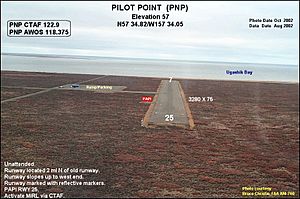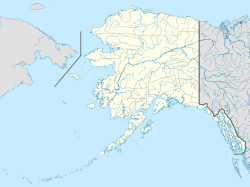Pilot Point, Alaska facts for kids
Quick facts for kids
Pilot Point, Alaska
Agisaq
|
|
|---|---|

Pilot Point Airport
|
|
| Country | United States |
| State | Alaska |
| Borough | Lake and Peninsula |
| Incorporated | 1992 |
| Area | |
| • Total | 154.80 sq mi (400.92 km2) |
| • Land | 24.55 sq mi (63.58 km2) |
| • Water | 130.25 sq mi (337.34 km2) |
| Elevation | 82 ft (25 m) |
| Population
(2020)
|
|
| • Total | 70 |
| • Density | 2.85/sq mi (1.10/km2) |
| Time zone | UTC-9 (Alaska (AKST)) |
| • Summer (DST) | UTC-8 (AKDT) |
| ZIP code |
99649
|
| Area code | 907 |
| FIPS code | 02-60640 |
| GNIS feature ID | 1407992 |
Pilot Point is a small city in Lake and Peninsula Borough, Alaska, United States. Its name in the Alutiiq is Agisaq. It is located on the Alaska Peninsula.
In 2020, only 70 people lived in Pilot Point. This makes it a very small community!
Contents
Where is Pilot Point Located?
Pilot Point is in a special spot in Alaska. It sits on an old hill made by glaciers, right next to Ugashik Bay. This bay is part of the larger Bristol Bay area.
The city covers a total area of about 140.5 square miles (363.9 square kilometers). Most of this area, about 82%, is water. The land area is much smaller, around 25.4 square miles (65.8 square kilometers).
How Many People Live in Pilot Point?
Pilot Point first appeared in the U.S. Census in 1940 as a small village. It officially became a city in 1992.
The population has changed over the years:
- 1940: 114 people
- 1950: 67 people
- 1960: 61 people
- 1970: 68 people
- 1980: 66 people
- 1990: 53 people
- 2000: 100 people
- 2010: 68 people
- 2020: 70 people
In 2000, there were 100 people living in Pilot Point. Many households had children under 18. The average age of people living there was 29 years old.
What is the Economy Like?
The main way people in Pilot Point make a living is through fishing. They especially depend on sockeye salmon. More than half of the people in Pilot Point work in the salmon fishing industry.
Some other jobs in the area include tourism, sports fishing, and hunting. There are also a few government jobs.
Images for kids
See also
 In Spanish: Pilot Point (Alaska) para niños
In Spanish: Pilot Point (Alaska) para niños
 | Kyle Baker |
 | Joseph Yoakum |
 | Laura Wheeler Waring |
 | Henry Ossawa Tanner |



